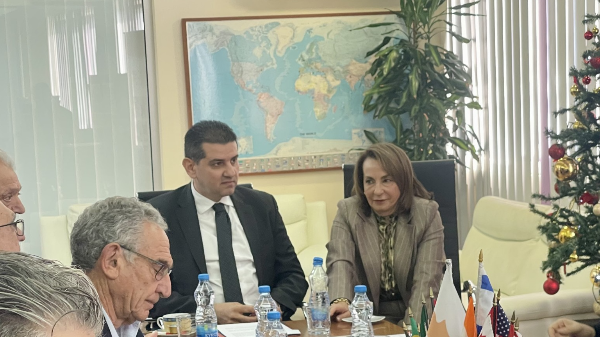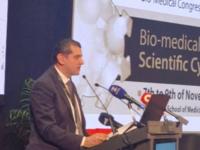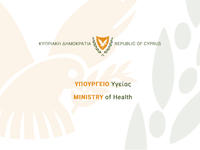Press Releases

17-12-2024 13:48
Address by the Minister of Health Mr Michael Damianos at a Scientific Workshop on Thalassaemia
It is an honour to welcome you to this important scientific meeting on the critical theme of “Liver Disease in Thalassaemia and Other Haemoglobin Disorders”. Today’s gathering exemplifies our shared dedication to advancing the understanding and management of liver complications associated with these complex, hereditary, chronic diseases. The significance of this endeavour cannot be overstated, as it directly impacts the health and quality of life of patients both on a global and a national level.
Allow me to acknowledge the exceptional contributions of Professor Geoffrey Dusheiko, whose unparalleled expertise, extensive research, and decades of clinical practice are invaluable to the discussions that will unfold over the course of this meeting. I also extend my heartfelt congratulations to the National Committee of Thalassaemia, the Thalassaemia International Federation, and the Thalassaemia Centre of Nicosia – a proud member of the European Reference Networks – for their exemplary initiative in organising this meeting. The insights shared here will undoubtedly benefit healthcare professionals across all relevant medical disciplines – internists, gastroenterologists, hepatologists – ultimately enhancing the care provided to patients with thalassaemia, sickle cell disease, and other haemoglobin disorders.
Thalassaemia and sickle cell disease are complex, non-malignant haematological disorders that alter the structure and production of haemoglobin in red blood cells. Without timely, well-structured and experienced multidisciplinary care, these conditions can lead to severe complications, particularly those affecting the liver. In Cyprus, we take immense pride in the exceptional care offered to patients with thalassaemia over the decades. In recent years, this commitment has extended to sickle cell disease, despite the comparatively smaller patient population. This commitment has enabled us to achieve one of the highest average life expectancies for thalassaemia patients worldwide, a testament to the quality and resilience of our healthcare system. Our efforts are bolstered by a national prevention program, which continues to demonstrate remarkable effectiveness.
However, as our patient population ages, there is an increasing need for comprehensive multidisciplinary care to support the efforts of the physicians working at the four Thalassaemia Clinics across the island, particularly with the new and multiple challenges that arise. On the other hand, the remarkable scientific and medical advancements being achieved must be made accessible and available to patients, as they hold the promise of enhanced management, improved quality of life, and even holistic cures for those who are eligible and in need. While advancements in chelation therapy have significantly mitigated cardiac complications and public health measures (including blood transfusion medicine) have nearly eliminated risks such as HBV, HCV, and HIV, liver disease still remains a critical concern.
Today’s meeting provides a vital opportunity to draw from international best practices and the experiences of other nations, enabling us to refine our strategies for addressing liver complications in haemoglobinopathies. Published literature, primarily from Western World Countries, highlights the prevalence and severity of liver disease in patients with haemoglobinopathies, raising alarms among patients, healthcare professionals, and policymakers alike. It is certainly anticipated that the situation in low-income countries is even more severe, given the challenges of suboptimal chelation therapy and other transfusion and public health risks.
In response to these challenges, I am pleased to share that the Ministry of Health of Cyprus has recently embarked on a significant initiative to enhance hepatology care. Two Cypriot doctors will soon commence specialised training in hepatology and transplant medicine at a prestigious university hospital in Germany. This initiative marks a pivotal step towards developing advanced transplant and post-transplant care for our patients while substantially enriching our national expertise in this critical medical field at national level.
Moreover, the Ministry remains focused in its commitment to support the recommendations of the National Thalassaemia Committee. Our objectives include the provision of comprehensive, evidence-based care, the enforcement of preparedness of emergency departments, and establishing dedicated reference centres for haemoglobinopathies. These efforts are bolstered by the dedication of our talented cohort of doctors whose unwavering commitment has been instrumental in advancing care for thalassaemia patients across our four national thalassaemia centres and beyond. I wish to particularly acknowledge the invaluable contributions of Dr Papanicolaou and Dr Flourou, as well as Dr Katsiouloudes, Dr Potamitis and Dr Xenophontos, whose tireless efforts continue to inspire us to strengthen our efforts on a national level.
Dear friends,
I am confident that this meeting will serve as a cornerstone for productive discussions, foster collaborative efforts, and pave the way for further advancements in the care of patients with liver complications in haemoglobin disorders. Together, let us reaffirm our commitment in improving the lives of our patients and their families.
Last but not least, allow me to extend my deepest gratitude to Professor Dusheiko for his invaluable contribution to this initiative and to each one of the stakeholders and individuals involved in the organisation of this meeting.
I wish you all a fruitful meeting and a healthy and prosperous 2025.
(DC)
Relevant Press Releases







